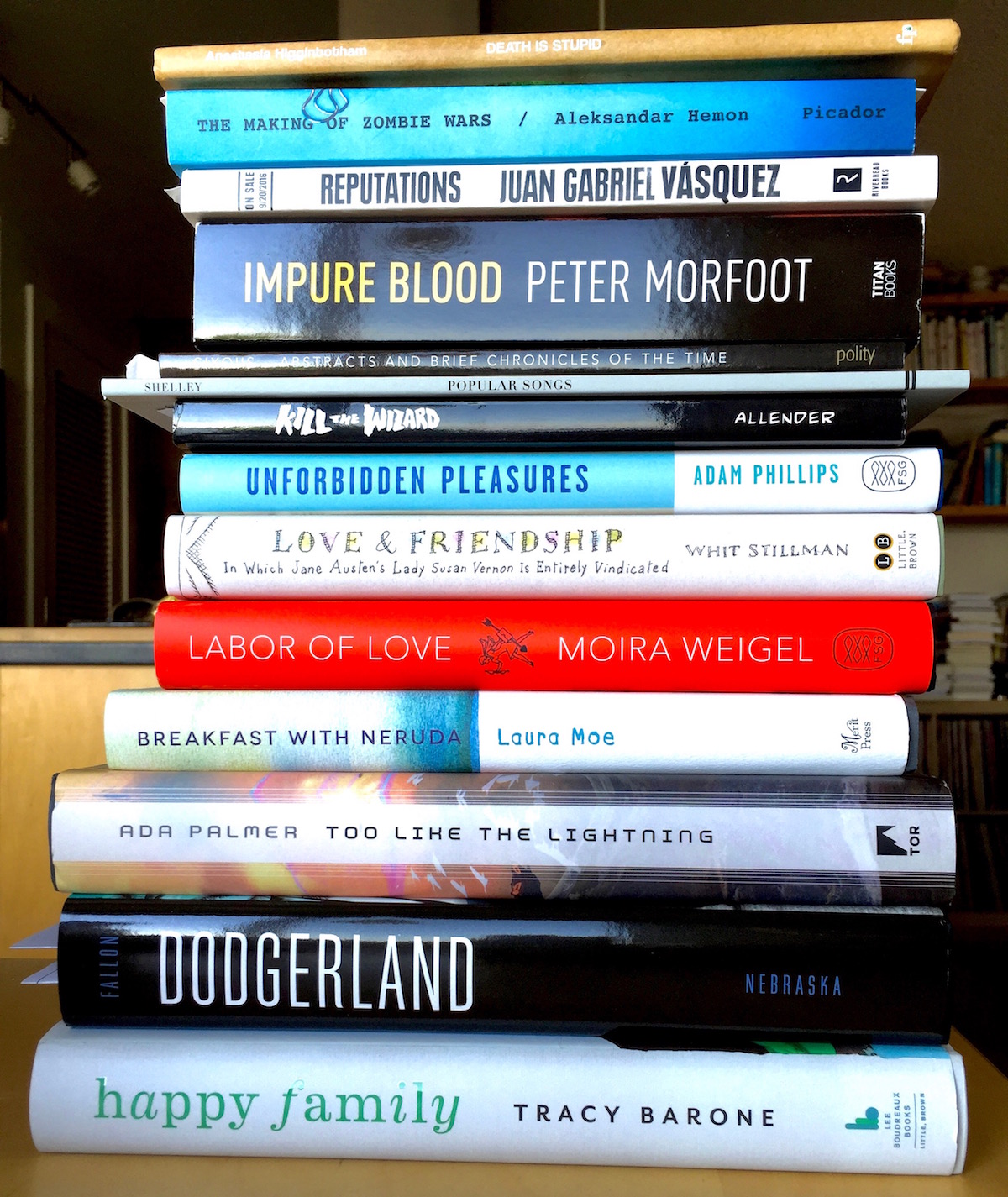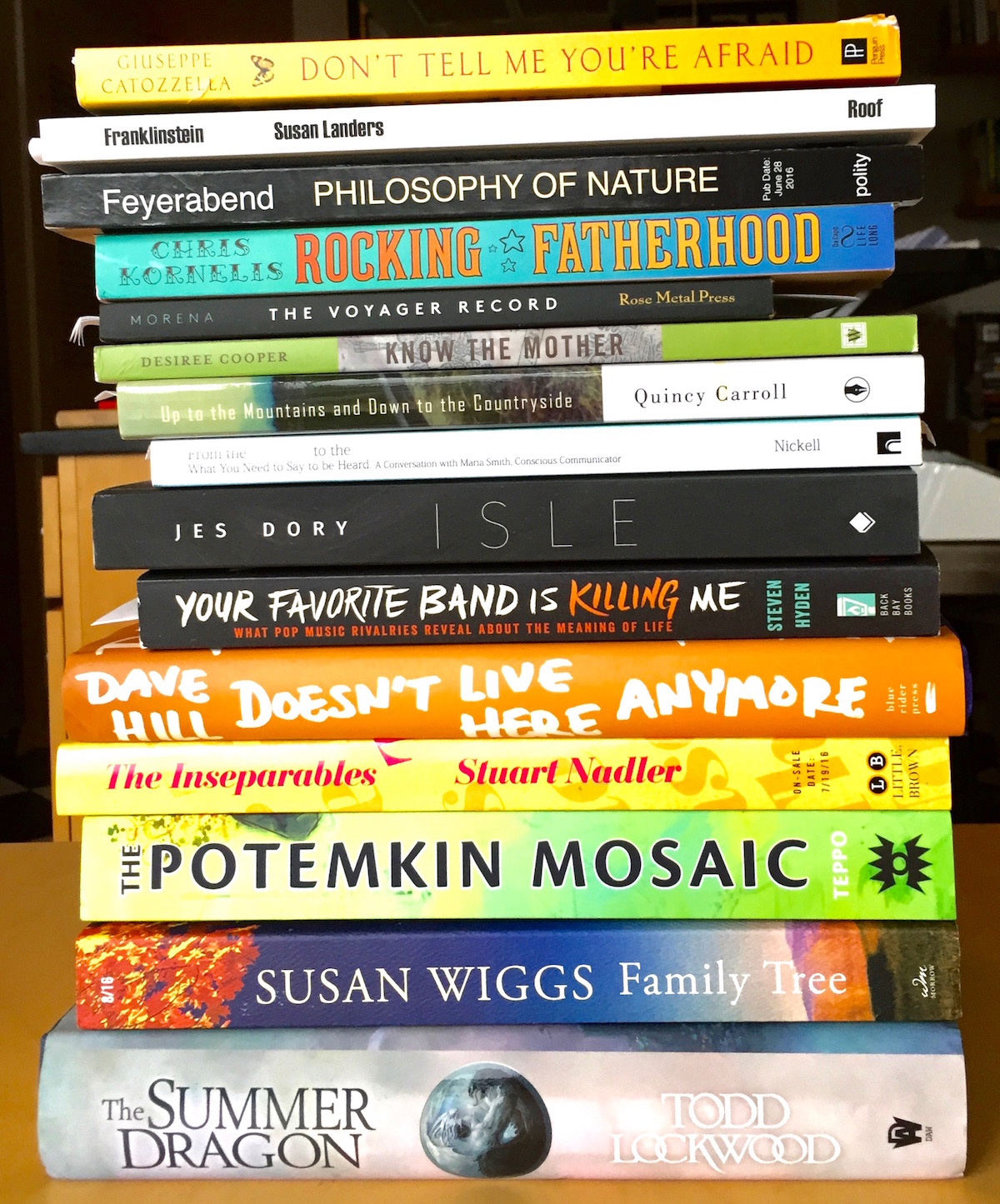The Sunday Post for May 1, 2016
Uncanny Valley
I have mixed feelings about this form — we've seen them before, notes from inside the boom industry. It's personal essay, not reportage, it's a confession from the one who accepted the paycheck and now feels that the price of this betrayal to their college idealism is exposure of their lush corporate lifestyle. We've read them from inside Wall Street and Hollywood, Real Estate, and now the tech boom. A lot of them from the tech boo.
Didn't it start from inside the factory? The genius with the blue collar job who wanted to make it writing truthy things about truth for the people who love truth? Bukowski inside the Post Office? (Which has its own set of problems, believe me.) But then it jumped from the blue collar punching up to the college graduate in privilege punching sideways.
The conceit is that the writer is an outsider among true believers, who will never buy into the mantras the company chant, that the writers at least confess to moving their lips along with.
These were my thoughts when I kept stumbling over links to Anna Wiener's piece in N+1 this week. What saves it, though, is her writing and detail. She inhabits the form, but makes it good, and that is definitely worth a link (and, Wiener will always have my ear after doing an amazing piece on Ellen Ullman for the New Republic earlier this year).
Morale is down. We are making plenty of money, but the office is teeming with salespeople: well-groomed social animals with good posture and dress shoes, men who chuckle and smooth their hair back when they can’t connect to our VPN. Their corner of the office is loud; their desks are scattered with freebies from other start-ups, stickers and koozies and flash drives. We escape for drinks and fret about our company culture. “Our culture is dying,” we say gravely, apocalyptic prophets all. “What should we do about the culture?”
The Case Against Reality
Amanda Gefter interviews the fascinating cognitive scientist Donald Hoffman:
As we go about our daily lives, we tend to assume that our perceptions—sights, sounds, textures, tastes—are an accurate portrayal of the real world. Sure, when we stop and think about it—or when we find ourselves fooled by a perceptual illusion—we realize with a jolt that what we perceive is never the world directly, but rather our brain’s best guess at what that world is like, a kind of internal simulation of an external reality. Still, we bank on the fact that our simulation is a reasonably decent one. If it wasn’t, wouldn’t evolution have weeded us out by now? The true reality might be forever beyond our reach, but surely our senses give us at least an inkling of what it’s really like. Not so, says Donald D. Hoffman, a professor of cognitive science at the University of California, Irvine. Hoffman has spent the past three decades studying perception, artificial intelligence, evolutionary game theory and the brain, and his conclusion is a dramatic one: The world presented to us by our perceptions is nothing like reality. What’s more, he says, we have evolution itself to thank for this magnificent illusion, as it maximizes evolutionary fitness by driving truth to extinction.
Noir Is Protest Literature: That’s Why It’s Having a Renaissance
Nicholas Seeley on what it is about noir that we can't leave alone.
What is it about crime films and novels from the 1940s and ’50s that calls to us so strongly? True, we are also drowning in superheroes, wandering dumbly through an endless series of post-apocalypses, smothered by the advances of paranormal romance… Each of these gluts derives, in part, from the scope of today’s near-infinite media universe, which offers space for just about anything to have a renaissance, but to the degree it includes mainstream as well as cult success, each also taps into specific cultural desires and anxieties of the moment. There are reasons why noir was powerful to begin with, and why it’s coming back now.
New Seymour Chwast Book Protests 5,000 Years of War - Kickstarter Fund Project #17
Every week, the Seattle Review of Books backs a Kickstarter, and writes up why we picked that particular project. Read more about the project here. Suggest a project by writing to kickstarter at this domain, or by using our contact form.
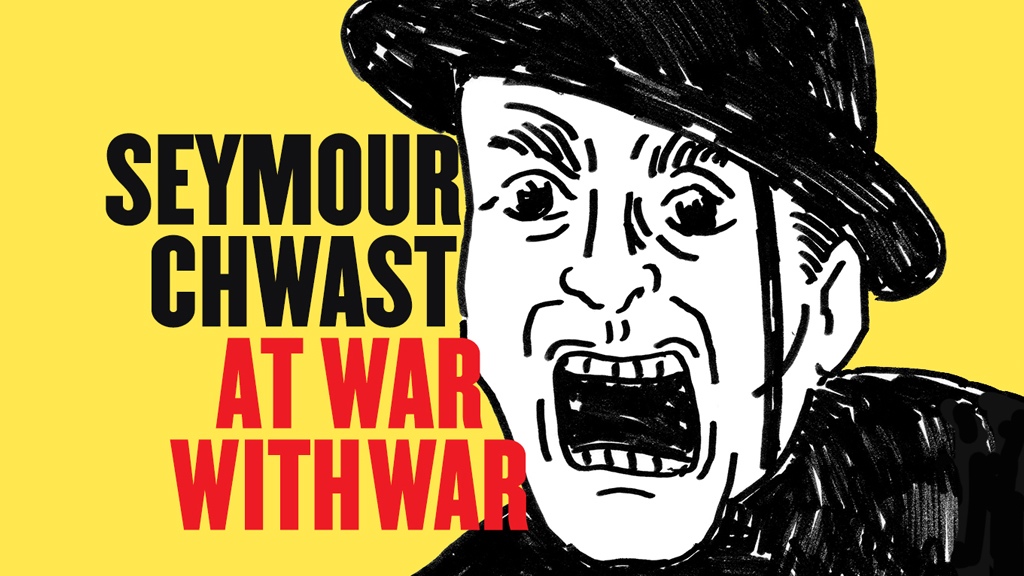
What's the project this week?
New Seymour Chwast Book Protests 5,000 Years of War. We've put $20 in as a non-reward backer
Who is the Creator?
What do they have to say about the project?
Design icon Seymour Chwast has used his art to battle war since 1957. His new antiwar book features 70 pages of original illustrations.
What caught your eye?
They aren't kidding when they call Seymour Chwast a design icon. He's a founder of the infamous Push Pin Studios, and designer of many recognizable things in American life. The Happy Meal box, for example.
He's used his illustration over the years to tell many stories, maybe most importantly, his anti-war message. In 1957 he published a book called A Book of Battles (good luck finding one today, the go for upwards of $4500 when they come around). This new volume is a new book, with a collection of line drawings done especially for it, collected with words to form his message — showing the brutality and idiocy of war.
Why should I back it?
Well, first, if you're a designer or a design appreciator, this will be a must-have, for the content itself. Second, it's being brought to life by an incredible team, such as editor Steven Heller. Designers & Books previously released another Kickstarter for a book reproducing an extremely rare book by Ladislav Sutnar that turned out marvelously. They know what they're doing.
And there are some great rewards, with many pieces from Chwast's long history working on design. Trust me. Even if you don't know his name, you've seen his work.
How's the project doing?
They're going for a big ask: $94k. They've well on their way to $28k of that so far, with 40 days left to go. Let's hope they make it. This is a book that deserves to be in the world.
Do they have a video?
Kickstarter Fund Stats
- Projects backed: 17
- Funds pledged: $340
- Funds collected: $280
- Unsuccessful pledges: 0
- Fund balance: $700
After you've celebrated Independent Bookstore Day tomorrow, I hope you'll come out to Phinney Books for a special edition of the Dock Street Salon. Spokane author Shann Ray, who wrote the novel American Copper, will read and then he and I will be in conversation. Copper is a novel about Montana in the early 20th century, and Ray has very interesting things to say about masculinity. He also, according to his bio, "teaches leadership and forgiveness studies at Gonzaga University," which is absolutely fascinating. So if you're up for a conversation about forgiveness, masculinity, basketball, and maybe bookstores, I hope you'll show up at Phinney Books around seven. It's free, and usually Dock Street brings along something to drink, too.
Wherein the collector puts his passions on display
Published April 29, 2016, at 12:00pm
Ricky Jay is many things: magician, actor, historian of magical lore. He is also a collector, and in his new book, he opens the flat-files in his archive to share a few tidbits.
The Help Desk: Color me vexed
Every Friday, Cienna Madrid offers solutions to life’s most vexing literary problems. Do you need a book recommendation to send your worst cousin on her birthday? Is it okay to read erotica on public transit? Cienna can help. Send your questions to advice@seattlereviewofbooks.com.
Dear Cienna,
I'm a bookseller at an independent bookstore in Seattle. (No, not that one.) I'm used to people having bad taste when it comes to books, but every time someone buys an adult coloring book from me, I become irrationally mad. It's getting so I can't even look them in the eyes anymore. I think they're a disgusting fad for rich people with way too much time on their hands. On the other hand, sales of adult coloring books are putting a roof over my head, so I probably shouldn't complain too much. How do I choke down this bile?
Juliet, Interbay
Dear Juliet,
I think adult coloring is supposed to sassy and therapeutic, like playing adult kickball or attending your coworker's cosplay divorce party. But I don't really get it either. I've received two adult coloring books as gifts and have had to fight the urge to say, "thanks but this isn't a real book." I suppose I know now how those "one man, one woman" marriage purists feel.
What I'm saying is, since we're losing this battle we might as well try to understand its appeal. Coloring seems to be therapy for adults who don't know how to address conflict with their words, so this week, I jotted down a few phrases that I said while in conversation with my neighbor and spiders, respectively, that I could tell irritated them but they were too polite to call me on.
Then I drew pictures of the phrases and gifted them to the offended parties, along with some chewed crayons I found. So far, neither has colored their drawings but I'm sure once they do, they'll feel much better. And they will thank me for it.
I encourage you to try it, Juliet, and see if it helps with your bile issues. I'm including copies of my drawings for you to practice on. Enjoy and remember: Get sassy with it! Those breasts don't have to be chicken colored, they can be any ol' color you choose!
Kisses,
Cienna
P.S. For all you eagle-eyed art connoisseurs out there, yes, that is a Georgia O'Keeffe vagina on the back of that heifer.
P.P.S. And yes, several spiders already pointed out that I don't know how to spell "heifer."
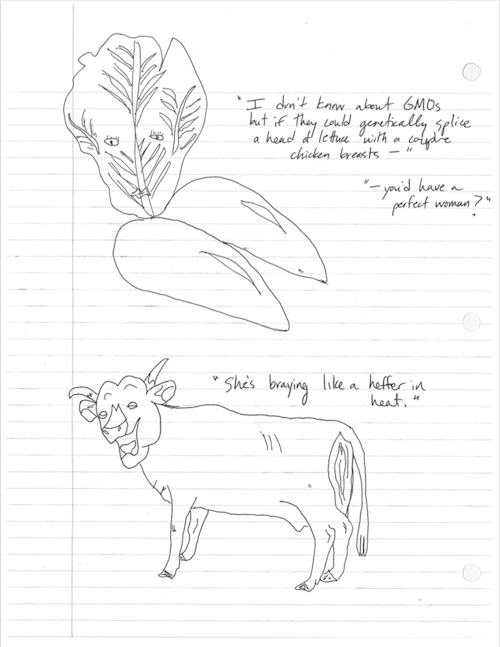
Portrait Gallery: Heather McHugh
Each week, Christine Marie Larsen creates a portrait of a new author for us. Have any favorites you’d love to see immortalized? Let us know
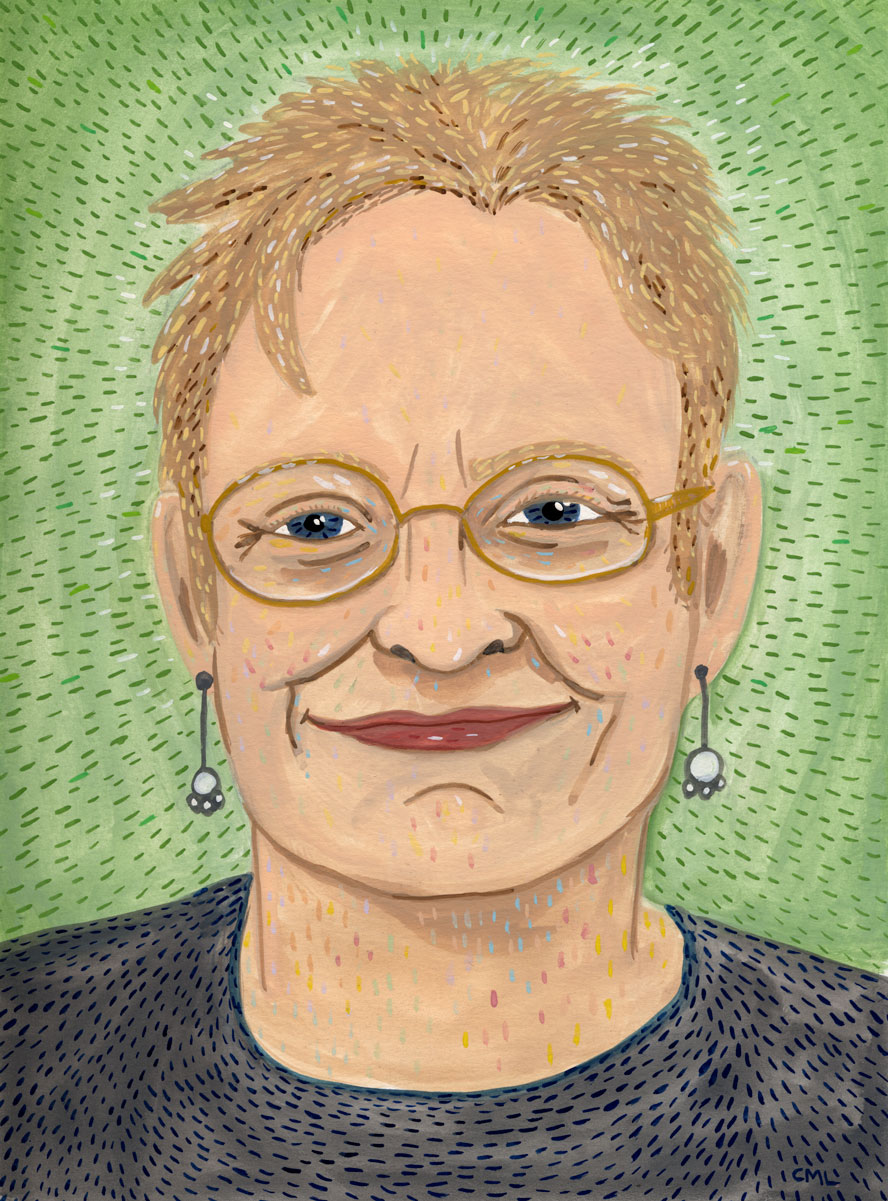
Local treasure and MacArthur award recipient, Heather McHugh reads Friday with Tod Marshall and Lucia Perillo at Folio: The Seattle Athenaem
What she thought, but did say
Published April 28, 2016, at 12:00pm
At the end of National Poetry Month, one writer looks back at a book he never fully walked away from.
Thursday Comics Hangover: Super weird
Superhero comics are supremely weird. What started out as a simple formula — every issue features a fight by page seven, a little bit of soap opera, and the beginning, middle, and end of a battle between good and evil — has now become a weirdly self-reflexive vocabulary that pretty much is only used to describe itself. Even as superhero movies have become the most popular genre at the multiplex, it’s hard to understand modern superhero comics without comparing them against years of knowledge of the genre.
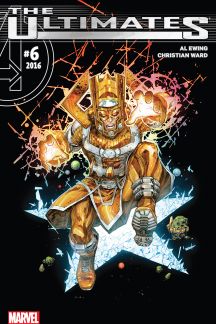
This doesn’t mean they’re necessarily bad. The sixth issue of The Ultimates, written by Al Ewing and illustrated by Christian Ward, is an almost impossibly weird comic book. Unless you’re familiar with fifty years of Marvel superhero history, you’re almost guaranteed to be totally lost. The main character of the story is Galactus, a giant space god who wears a ludicrous helmet and eats planets for a living, as he tries to discover who has chained up the living personification of the universe. Along the way, he hits a giant disembodied space-head right in the face. (“On our level, combat is metaphor,” Galactus explains, “A clash of ideas.” Okay.)
What Ewing is doing with The Ultimates is pushing comic book physics to its limits, examining superhero time travel and its repercussions, and dissecting the impossible sci-fi physics created by Jack Kirby in the 1960s. It’s almost impenetrably postmodern, a wild and weird journey through four-color quantum physics. If you spent years of your youth wondering how the Marvel Universe doesn’t collapse in on itself from all the time-travel and alternate-dimension hopping its heroes do, this is the book for you, a metatextual journey through gaudy superheroic philosophy. If you have no idea what I’m talking about, you should probably give it a miss.
This week also saw the end of writer Scott Snyder and artist Greg Capullo’s run on Batman. Their Batman has been one of the only roundly applauded creative runs of the DC Comics "New 52” reboot initiative, in which their entire line was relaunched in hopes of finding a new audience. (Given that DC is about to reboot their entire line again next month, the New 52 seems to have mostly been a failure.)
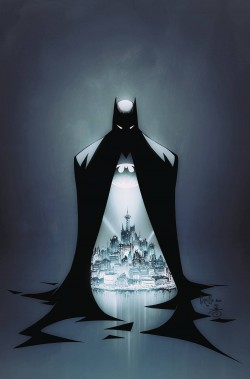
Much of Snyder’s reign as writer has, frankly, not appealed to me — his interpretation of the Joker as a psychopathic butcher whose face was removed, dried out, and then worn on top of the exposed muscles of his face as a mask was, uh, a little over-the top. But other parts of Snyder’s run have been incredibly fun, most notably the last stretch, which featured Commissioner Gordon stepping in as Batman in a goofy superhero fantasia.
Thankfully, Batman issue 51 — the final collaboration between Snyder and the highly competent Capullo for the forseeable future — leans more toward the fun superhero side of Batman than the pair of overly grim and gruesome Joker stories Snyder wrote into the run. This is a Batman who has time to joke around with Alfred. He’s confident enough in his masculinity to walk around in Capullo’s smart redesign of the Batman costume, which features splashes of color like yellow and — gasp! — a purple lining to his cape. Sure, the story gets a little hammy, but a Batman comic without operatic symbolism isn’t much of a Batman story, after all.
In the end, Snyder and Capullo are leaving the character in better shape than when they started. Rather than the ridiculously obsessed Batman of the 80s and 90s, their Batman is a little looser, a little more vibrant, and a lot more fun. What’s the point in doing a superhero comic, they seem to be asking, if you’re not going to get a little weird with it?
I just want to call your attention to what should be a magnificent book event tonight. Poet Kevin Young is giving a craft talk at the Hugo House starting at 7 pm. Young is one of the very best American poets; his last collection, Book of Hours, destroyed me with its raw depiction of grief. It's one of the best collections I've read in recent memory. (You can read my review here.) In addition, Young is being interviewed by Jane Wong, the excellent local poet whose work has appeared on the Seattle Review of Books on more than one occasion. This should be a night to remember.
As part of the celebration for Independent Bookstore Day some industrious bookstore lovers have created an online quiz called "Which Seattle-Area Bookstore Are You?" I got Bainbridge Island's Eagle Harbor Company.
Seattle historian Erik Larson, who is best-known for his white-knuckle non-fiction thriller The Devil in the White City, will be doing an Ask Me Anything on Reddit in about one hour. If you have a question about Larson's latest book, Dead Wake, you should pop on over and ask him.
Introducing Billie Swift, the new owner of Open Books
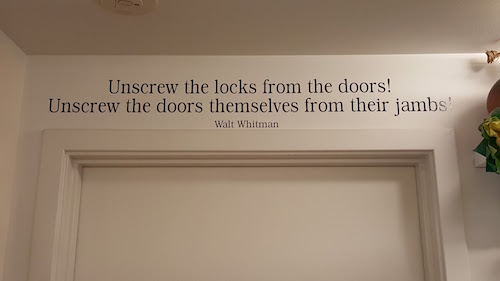
Billie Swift knew she was heading toward a defining moment when she heard that John Marshall, the owner of Open Books, was planning to retire. Swift is on her way to completing the MFA at the Rainier Creative Writing Workshop at Pacific Lutheran University this year, and so she was already at a crossroads in her life. What did Swift feel when she first read Marshall’s email? “Panic,” she laughs over the phone, and an “immediate sadness.” She says she feels compelled to use the word “necessary” to describe Open Books. “It just seemed sort of impossible that it not exist,” she says, and so she immediately started entertaining the possibility of buying the bookstore.
Of course, the concept of owning a bookshop in 2016 is a daunting one. “I stopped and considered more what that would mean and how possible that would be,” Swift says. She asked herself, “is this even possible? And then I talked to my family about it and yeah, I realized it might be.” From there, “I just sort of kept the conversation going with John and [Open Books co-owner] Christine [Deavel] and every conversation just seemed to confirm that it was possible. And it went from there.” From now on, Swift will be a regular fixture at Open Books, meeting customers and learning about the store’s day-to-day operations from Marshall. She’ll officially become the new owner in August.
Swift was born in Seattle, but she moved back here to stay in 2006 after years in New York. A quick Google search reveals a 2011 post she wrote for the New Yorker in which she already sounds absolutely besotted with literary Seattle. “Seattle doesn’t really have a literary scene, per se,” she wrote. “No, what Seattle has is more like a community.” Five years later, she’s taking over one of the most important pillars of this community, a sacred space for Seattle poets and a beloved destination for traveling lovers of poetry.
When asked if she has any plans in mind for the store, Swift sounds genuinely surprised. “I’m sitting here in the storeroom looking around,” she says, “and I think I’m definitely still just very excited to keep this store and this space going. Right now the focus is on how to maintain what to me is such an incredible poetic space and ensure that stays available.”
Does she have any particular fond memories of Open Books as a customer? “My family would come in here and go Christmas shopping. They’d tell John and Christine who they were shopping for, and John and Christine would help them pick out books.” And as she was working through her MFA program, Swift says she “would just come in here just to talk ideas out loud. I would need to have a conversation about something, whether it was a paper or a poem,” and Open Books was a place where she could do that.
“I think it’s going to be really fun to start having more readings and events and more opportunities for people to be in this space in under different circumstances,” Swift says. She’s put a lot of thought into what Open Books represents, what it means “to be in this space when there are one or two people browsing, or to be in this space in a reading, or to be here in the middle of a conversation about a book. It’s interesting to see how the space changes and how it stays the same.”
When I say that Swift seems to be thinking about the store in terms of a conversation, she perks up. “That’s what it is,” she says. With Open Books, she says, John and Christine have mimicked “this great sense of words-meets-white-space that you can fall into. When you’re here in this store, it feels so expansive and yet contained, in the way that a poem feels expansive and contained, and I love that. I love what they’ve done here. I think it’s such a wonderful place.”
So does the new owner have anything to say to Open Books customers who want to know where she’s coming from? “For those who love the space,” Swift says, “I love the space too — very, very much. At the very least we have that in common. Maybe when you come in we can discover more things that we have in common.” It’s a conversation that Swift seems eager to have.
Your Week in Readings: The best literary events from April 27 - May 3
Wednesday April 27: Local Voices
Seattle Arts and Lectures’ Writers in the Schools program delivers some of the best Seattle-area writers (and visiting authors) to local students who are hungry for writing education. Tonight, Seattle-area WitS all-star teachers present new work, including Rachel Kessler, Sierra Nelson, and Anastacia Tolbert. Hugo House, 1634 11th Ave, 322-7030, http://hugohouse.org. Free. All ages. 7:30 p.m.Thursday April 28: Hannah Faith Notess and Amelia Martens
Seattle author Notess, who writes wonderful poems about the problematic experiences of avatars in video games, teams up with Kentucky poet Martens, whose new book The Spoons in the Grass Are There to Dig a Moat is a beautiful little collection of prose poems about nature and Jesus and IKEA housing for refugees. Queen Anne Book Company, 1811 Queen Anne Ave N., 284-2427, http://qabookco.com. Free. All ages. 7 p.m.Friday April 29: Tod Marshall, Heather McHugh & Lucia Perillo
Three Washington poets celebrate the end of National Poetry Month at downtown’s newest literary events space. McHugh (who does not read in Seattle nearly enough for my tastes) and Perillo are both MacArthur “Genius” grant winners. Marshall is Washington state’s newest Poet Laureate, and is a tireless advocate for local poetry. Folio: The Seattle Athenaem, 324 Marion St., 402-4612, http://folioseattle.org. Free. 7:30 p.m.Saturday April 30: Independent Bookstore Day
See our Event of the Week column for more details. Various bookstores around the Puget Sound, http://indiebookstoreday.com. Free. All ages.Sunday May 1: Weed & Memoir
While there will be no pot sold or consumed on Hugo House’s premises for this event, organizer David Schmader wants you to, if at all possible, show up stoned. Schmader, Angela Garbes, and Tina Rowley will read original memoir pieces, and readers including Charles Smith and Michelangelo Matos will read provocative pieces from entertainingly trashy celebrity autobiographies.Hugo House, 1634 11th Ave, 322-7030, http://hugohouse.org. $5. All ages. 7 p.m.Monday May 2: Pamela Haag
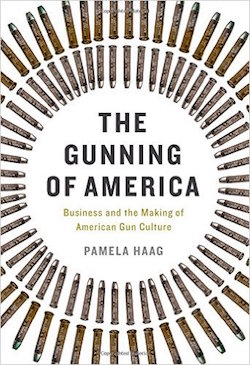
Tuesday May 3: Black Box: A Record of the Catastrophe
Black Box: A Record of the Catastrophe is a new journal of “various timely and timeless political and philosophical propositions,” mostly devoted to the idea of revolution. Tonight, local contributors including Charles Mudede, Alejandro de Acosta, Emily Abenfroth, and Corianton Hale will read and discuss what Black Box means to them. Elliott Bay Book Company, 1521 10th Ave, 624-6600, http://elliottbaybook.com . Free. All ages. 7 p.m.Event of the Week: Independent Bookstore Day on Saturday, April 30
When the Mall del Norte branch of B. Dalton booksellers closed in January of 2010, CNN reported, the city of Laredo (population 250,000) became the largest American city without a bookstore. “The closest bookstore is now 150 miles away, in San Antonio, Texas,” wrote CNN’s Ed Lavandera. Laredo was likely just the first of many American bookstore deserts, as Barnes & Noble continues to falter with every quarterly earnings report and rural retail zones get sucked dry by Walmart and Amazon.
Seattle stands apart from the nation because we have a dense population of thriving independent bookstores, and on Saturday, April 30th, those bookstores are throwing a party to celebrate our unique bookstore culture. Seventeen local booksellers (including far-flung shops like Liberty Bay Books in Poulsbo, Edmonds Bookshop, and Island Books on Mercer Island) are observing Independent Bookstore Day with exclusive books, prize giveaways, and author appearances.
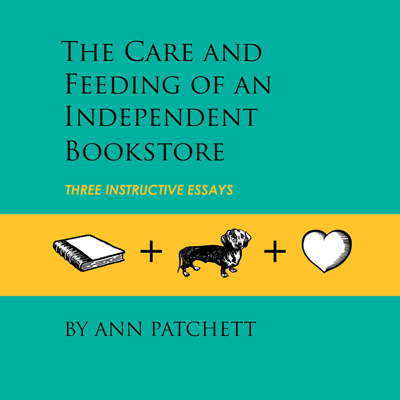
A complete list of events would be way too long for this space—check your local booksellers’ website for schedules—but highlights include a local sci-fi authors panel (featuring Greg Bear, Robin Hobb, Elliott Kay, and Matt Ruff) at University Book Store, free coffee and scones at Third Place Lake Forest Park, a release party for Underground Seattle featuring local cartoonists at Fantagraphics Bookstore and Gallery, all sorts of cooking demos all day long at the Book Larder, cake at Secret Garden Books, and novelist Stewart O’Nan at Elliott Bay Book Company. (And at 7 pm, I’ll be doing an onstage chat with American Book Award-winning author Shann Ray at Phinney Books.)
It’s impossible to imagine a Seattle without its array of independent bookstores catering to every audience, from the stalwart genre outposts like Seattle Mystery Bookshop in Pioneer Square, which just earned a new lease on life thanks to a successful crowdfunding campaign, to the STEM-obsessed Ada’s Technical Books on Capitol Hill. These bookstores are the reason why Seattle has such an atypically overstuffed literary calendar for an American city, with anywhere from 3 to 7 literary events happening every single weeknight, and they supply us with our national reputation as a home for hyper-literate book nerds.
Artistically and commercially, Seattle’s values are closely aligned with the values of independent booksellers. We revere books, we loathe censorship, and we absolutely hate it when someone tries to control the way we think. Maybe that’s why we’ve got the best damn bookstores in the country.
On Facebook, Seattle author Elissa Washuta writes,
Here's something I'm doing this summer: hanging out in a TOWER in the Fremont Bridge and writing about the bridge, the canal, the city, the original inhabitants of this land, the now-unseen world, and my personal relationships with other bridges. Thank you to the Office of Arts & Culture Seattle for giving me this amazing opportunity. I will be posting again soon to ask for stories to help me with this project.
Congratulations to Washuta; we can't wait to read your dispatches from the bridge.
It was published earlier this month, but I just saw it now: YA novelist John Green's response to his book Looking for Alaska landing on top of the year's most-challenged book list is pretty damn good. That last line is downright scathing:
Something I will never understand: when will these book-banning schmucks realize that the best way to get kids excited about a book is to try to ban it?
New Hire: Neal Bascomb found a community of writers in Seattle
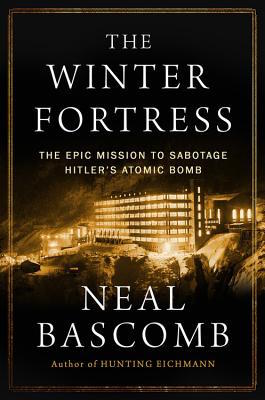
For as long as Seattle has been a city, people have come to town and people have left town. The Seattle Review of Books has a recurring feature called Exit Interview, in which we talk with an author who recently left town about their Seattle experience. The natural pair to that feature is New Hire, an interview with an author who’s just arrived here. (If you have any suggestions for a subject of an upcoming Exit Interview or a New Hire, please drop us a line.) Our latest New Hire is historical nonfiction author Neal Bascomb. Bascomb's newest book, a Norwegian World War II espionage story called The Winter Fortress, will be published next week with a launch party at Hugo House on May 5th. We'll have more about Winter Fortress in the days to come, but for now enjoy this conversation with Bascomb about what his moving-to-Seattle experience has been like.)
When did you move to Seattle?
I moved to Seattle in August of 2015.
Where did you move from?
Philadelphia. We've been an East Coast family: New York first, and then Philadelphia the last fifteen years.
What brings you here?
We always wanted to live here. I went to Miami University, in Ohio, and a good contingent of my friends all moved to Seattle right after college. I've been coming out here every year for 20 years and loving it, but it didn't really make sense for me because I was in publishing. Because I was a book editor, a journalist, my work was really in New York.
We finally got to a point where we knew we wanted to make a decision between here and London. My wife used to be a book editor at Random House, that's how we met. She got offered a job at Amazon. We decided to move here versus London. It's been great; I love it. We have two young girls, and we love the skiing and the hiking, and the boating, and everything. I'm a full-time author, so if there's coffee shops, I'm usually pretty good, and clearly, there are a lot of coffee shops here. I’m right in my happy zone.
Twenty years ago, you probably would not have been able to live in Seattle and work in publishing as easily as you can now. Do you agree? You know, the publishing industry is still very centered around New York, but I'm finding more and more that authors are choosing to stay in Seattle, which is something that 20 years ago wasn’t possible.
Well, originally I'm from Missouri, so I moved east, to New York, to work at a publishing company. Back 20 years ago, the only place to work in a major publishing house was New York. I knew I always wanted to be a writer and author — New York was really the only way to do that. I was a journalist, too, and so most of the magazines and everything was New York-centric. But I got to a point where I could live anywhere.
I think the difference is 20 years ago, if I had moved out here, it would have been a loss in my career. Publishing was so New York-centric 20 years ago. Now, it's it feels much more diffuse. I feel like there's writer communities everywhere. I had a community in Philadelphia, and I'm certainly finding one here in Seattle. Since it's such a — not an isolated job, but a job where you're on your own a lot — it's nice to have a good community of writers, and I feel like Seattle has that in spades. With Hugo House, and just the number of writers that are here, it's a good place to be a writer.
It sounds like you got wise to Hugo House as a place to be pretty early on. A lot of writers, it takes them a while to discover the House as a resource.
It turns out, I bought my house from someone on the board of Hugo House. I think I was at Hugo House within a week of moving here. I met [Hugo House Executive Dirctor] Tree [Swenson], who's wonderful. I started a little writers' drinking club. I think it's important to have that community. It's small, but growing.
How did you get a hold of local writers? Because there's that Seattle freeze that everyone always talks about, and when you combine that with writers, who are normally antisocial, it seems like socializing might be a problem.
I feel like the Seattle freeze is seasonal. When we first got here, I didn't feel it at all: it’s August, it’s beautiful, people are outside, having outside parties and barbecues. I met a couple writers that way. As soon as winter hit, it was like the city was shut down.
Does it matter what the writers in your writing groups write? Does it help to have other writers of historical books around you?
No, and preferably not. [Laughs.] No — I mean there's novelists, and memoirists, and journalists, so it doesn't matter.
I'm sure Seattle has more popular historical authors than just these two, but off the top of my head, there's Tim Egan and Erik Larson, who have both written very popular and very good historical books. They tend to keep to themselves a little more than some of the other writers in the community. Is that a cultural thing? Do historical writers tend to bury themselves in their research, and not get out as much? Is that just a gross overgeneralization on my part?
You know, I can't speak for Tim or Erik. I met Tim, and he seems like a lovely guy. I'm buried for two years at a time doing research — typically traveling, typically aswim in paper. Perhaps it's that, more than anything else. And then when I'm not researching, I'm writing.
It is interesting that there are quite a few [authors of historical books in Seattle], including [Daniel James Brown, author of] The Boys In The Boat. Maybe we should start a subset: “The historical narrative nonfiction club.” We'd have to think of a catchy title.
Yeah, that doesn't acronym well. What surprised you the most about Seattle as a literary city when you moved here?
I'm not sure if it surprised me, but because I wasn't looking for it, but I will say that the access to the community of writers, whether it's Hugo House, or just book events, is huge. It just seems so much more accessible and welcoming than, let's say, New York, which can be cliquey. It just seems more down-to-earth here. It would be hard, I think, to go back.
Is there anything that you were surprised that we didn't have when you got here? Is there anything, say, in Philadelphia, in New York, that they have, that you think Seattle could really use?
University of Washington has a good library, but for my purposes, it's — gosh, I don't want to sound like I'm trashing the University of Washington. It's just the amount of books that they have just isn't at the par that you can find in New York or Philadelphia. For instance, in New York, if you can't find it at Columbia, you can find it at NYU. If you can't find it at NYU, then you can find it at the New York Public Library.
Here, the University of Washington is really the big university, and just by its sheer size, the stacks aren't as robust.
Yeah, and there hasn't been the time to develop the institutions, either. It's only a hundred-and-fifty years old.
Yeah, exactly. That's been one challenge, just in terms of the kinds of books that I write — by no means insurmountable.
Do you ever think of yourself as a Seattle writer, or does region come into it at all, given your subject matter? Do you think there's ever a time where you would see yourself as the Seattle writer?
Yeah. I mean, I lived in New York for I don't know how many years — over a decade. Philadelphia for six. I never considered myself a New York writer. I never considered myself a Philadelphia writer. I don't know if I'll consider myself a Seattle writer. I just consider myself a writer, because the types of books I write are just so all over the place, in terms of subject and location.
I would love to find a Pacific Northwest subject. That would be awesome. I'd love to try to really dig into culture here and the history. The way that I learn about a place through my books is so rich, because I spend so much time researching, that it'd be tremendous to find that here, in the town that I live in. If anyone has a great story, that's been untapped, I’d love to hear it. For instance, with The Boys On The Boat, which was wonderful, you learn so much about Seattle, and its history. To be able to find something, some story, set in the Northwest, would be great. Maybe that would make me a Seattle writer.
Did you read up on Seattle before you moved here, or did you do research before the move?
No. I had been coming here every year, or every other year, for so long that I felt like I knew it. Of course, that's not true — even though I've been out here over a dozen times, I didn't really get a sense of how much of a water city it is until I lived here. I didn't really get a sense of how hilly it was until I moved here.
One of the things I love about living here and writing is that I figure out a lot of my writing while running. I work through problems, or structure, or how I'm going to write something. Being outside really — for me, it helps. It's been one of the things I've loved so far in living here, just the sheer awesomeness of the outdoors. In Philadelphia, for instance, I ran the same path on the same river every day. Here, I can be in the woods in a second, hill running. Which I think has actually been good for my writing.
Carolyn Kellogg at Jacket Copy has the full list of the sci-fi/fantasy Hugo Award finalists. Here's the novel category:
- Ancillary Mercy by Ann Leckie
- The Cinder Spires: The Aeronaut's Windlass by Jim Butcher
- The Fifth Season by N.K. Jemisin
- Seveneves: A Novel by Neal Stephenson
- Uprooted by Naomi Novik
Kate Macdonald reviewed the first book in Leckie's Ancillary series, Ancillary Justice, for us last year. And our cofounder Martin McClellan reviewed Stephenson's Seveneves almost a year ago.
Of course, last year, the Hugo Awards finalists were overtaken by a horde of men's rights dimbulbs, and I see some of those same names on some of the categories again this year. But those conservative jackasses didn't win any awards last year, and they won't win this year. Let's not make the story about a few loud and crass white men. Instead, let's celebrate the sci-fi writers who deserve our celebration.
